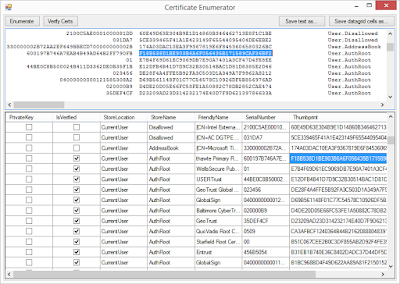Recently, my windows quit updating. Just prior to that, I had been messing around with my certificate store, so I suspected that to be the cause. Running Microsoft's troubleshooter reset the download, which I had a lot of hope of fixing the issue, but the download still continued to to fail. I decided to check the Windows Event Logs, and that's where I found an error message about a certificate in the chain failing. I knew it! However, I did not know whether a trusted certificate accidentally got put in the untrusted store, or whether an untrusted certificate was accidentally put in the trusted store. I needed a way to search all of my certificates' thumbprints or serial numbers against a know repository of trusted or untrusted certificates.
Microsoft's certificate snap-in for MMC does not allow you to view certificates in an efficient way. Opening them one at a time, manually, and then scrolling all the way down to where the thumbprint is displayed to compare it to a webpage is painful. Also, I was not satisfied with the way that Microsoft allows you to search the certificate store. The search is not very effective and you cant even search for thumbprints! Also I do not believe the search feature allows you anyway to copy any of that information to clipboard.
Most of what I needed to accomplish could simply be done if I could just export all of my computers certificates thumbprint or serial numbers to a text file, csv file, or other simple and searchable format. Then I thought to myself, I know how to do that! It was the great the lack of features of the MMC certificate snap-in, and the inability to search for certificate thumbprints that inspired me to write my own certificate utility, known simply as Certificate Enumerator.
CertificateEnumerator can list every certificate in your various certificate stores for your local machine and currently logged in user. It can then display that information to you either in a DataGridView or TextBox (as columnarized text), and provides the ability to persist that information to file as text, comma separated values (CSV), excel format or HTML table.
The Certificate Enumerator also has the ability to 'validate' each certificate against its CRL (certificate revocation list), if it supplied one.
The GUI could really use some love. In case you missed it, the project is on my GitHub, so feel free to download the source and play with it. If you come up with useful, submit a pull request.
